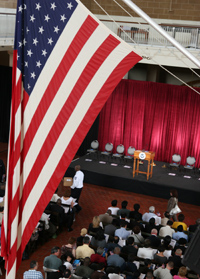I believe the saying goes, No matter how much things change, they seem to remain the same.
 This can easily be said for the United States on immigration policy as it relates to Mexico. We have discussed in class some of the measures currently being discussed to diffuse the topic of illegal immigrants. Such as building a fence, making every one legal as they stand in the U.S. today, renewable temporary work permits, security and health checks, pay a fine and become legal, they take jobs from citizens, they lower the wage scale, etc. These are exactly the same options and concerns tossed about from our readings going back to the 1930s 1950s as they relate to illegal immigrants.
This can easily be said for the United States on immigration policy as it relates to Mexico. We have discussed in class some of the measures currently being discussed to diffuse the topic of illegal immigrants. Such as building a fence, making every one legal as they stand in the U.S. today, renewable temporary work permits, security and health checks, pay a fine and become legal, they take jobs from citizens, they lower the wage scale, etc. These are exactly the same options and concerns tossed about from our readings going back to the 1930s 1950s as they relate to illegal immigrants.  The Bracero Program, according to the Truman Commission, said that this government sponsored contract labor program would eliminate illegal migration bring order to the farm labor market and protect foreign nationals from abuse. This was clearly not the case as with many government programs there were abuses and no money for enforcement. The Bracero Program legally allowed growers to bring in the help they needed from Mexico and pay them below wage even though they were to have a set wage. They allowed the workers to be housed in poor conditions and made them pay for their board and food.
The Bracero Program, according to the Truman Commission, said that this government sponsored contract labor program would eliminate illegal migration bring order to the farm labor market and protect foreign nationals from abuse. This was clearly not the case as with many government programs there were abuses and no money for enforcement. The Bracero Program legally allowed growers to bring in the help they needed from Mexico and pay them below wage even though they were to have a set wage. They allowed the workers to be housed in poor conditions and made them pay for their board and food. The Filipinos has somewhat the same strife as the Mexican farm worker except they seem to be more willing to strike and use the court system. They also seem to have a few advantages over their Mexican counterparts. The Filipino government looked out for their citizens that came to America. They set up agents in the US, they had a dialog with the US government, and more importantly the US needed their country for military reasons. Although the Philippines were a US territory, they still held some leverage against the US government.
The Filipinos were grouped in with the Chinese; they were excluded from becoming citizens. They tried to argue that of all the Asian groups, they assimilated the best with the American (white) culture. This did not hold up in court. People did not believe that “brown†people could obtain the same intelligence, morality and social characteristics of people. On page 117 of Ngai, there is a quote by Attorney General U. S. Webb, We thank God that only we, the white people, found it first (America) and we want to be protected in our enjoyment of it.






.jpg)












